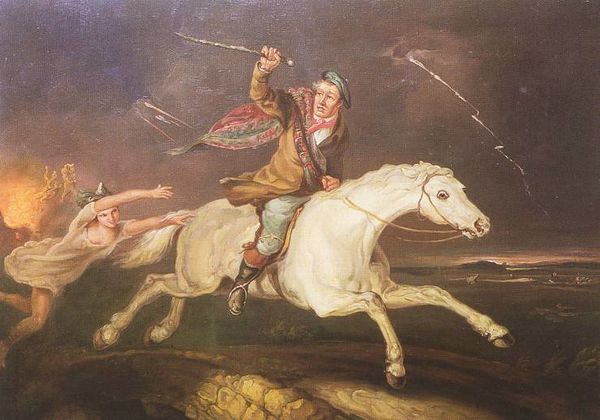Annotation:Tam's Grey Mare: Difference between revisions
No edit summary |
No edit summary |
||
| (7 intermediate revisions by the same user not shown) | |||
| Line 1: | Line 1: | ||
{{TuneAnnotation | {{TuneAnnotation | ||
|f_annotation='''TAM'S GREY MARE.''' Scottish, Reel (whole time). E Dorian. Standard tuning (fiddle). AAB. "Tam's Grey Mare" was composed by Scottish fiddler-composer and bandleader [[biography:Joseph Lowe]]. | |f_annotation=[[File:Tamo2.jpg|right|600px|thumb|]]'''TAM'S GREY MARE.''' Scottish, Reel (whole time). E Dorian. Standard tuning (fiddle). AAB. "Tam's Grey Mare" was composed by Scottish fiddler-composer and bandleader [[biography:Joseph Lowe]]. The title is a nod to Robert Burns' famous poem "Tam o'Shanter", in which Tam is possessed of a steed named Maggie, who is indeed a grey mare. Farmer Tam is drinking one night in a tavern in Ayr, whilst the weather worsens. As they head home they pass Alloway Kirk and happen upon a gathering of witches and warlocks, dancing, presided over by the Devil. Taken with the scene (and the witches, who have reduced to their shifts), the whisky-addled Tam cannot help but exclaim "Weel done, Cutty Sark!" to young Nannie, one of the dancers. He is undone and flees on Maggie, chased by the unholy group, and heads for the stream (which he knows no witch can cross), but as Maggie leaps for the safety of the far side: | ||
|f_printed_sources=Joseph Lowe ('''Lowe's Collection of Reels, Strathspeys and Jigs, book 4'''), 1844–1845; p. 15. | <blockquote> | ||
|f_recorded_sources=Lochshore Records, Cannach - "The Moons of Glenloy" (1997). | ''For Nannie, far before the rest,''<br> | ||
''Hard upon noble Maggie prest,''<br> | |||
''And flew at Tam wi’ furious ettle;''<br> | |||
''But little wist she Maggie’s mettle –''<br> | |||
''Ae spring brought off her master hale,''<br> | |||
''But left behind her ain gray tail;''<br> | |||
''The carlin claught her by the rump,''<br> | |||
''And left poor Maggie scarce a stump.''<br> | |||
</blockquote> | |||
See also the Lowe brothers' "[[Witches (2) (The)]]" and "[[Warlock's Strathspey]]," also inspired by the poem. | |||
|f_printed_sources=Cranford ('''Jerry Holland’s Collection'''), 1995; No. 133, p. 38. Joseph Lowe ('''Lowe's Collection of Reels, Strathspeys and Jigs, book 4'''), 1844–1845; p. 15. | |||
|f_recorded_sources=Lochshore Records, Cannach - "The Moons of Glenloy" (1997). Lochshore Records, Iron Horse - "Thro' Water, Earth and Stone" (1993). | |||
}} | }} | ||
Latest revision as of 02:58, 19 July 2021
X:1 T:Tam’s Grey Mare C:Joseph Lowe M:C L:1/8 R:Reel B: Joseph Lowe - Lowe's Collection of Reels, Strathspeys and Jigs, B:book 4 (1844–1845, p. 15) Z:AK/Fiddler’s Companion K:Emin A|:E-BBA G-FGA|BEE^c dcBA|E-BBA G-FGB|ADFA d^cBA:| Begf e^de2|B-egf efgb|Begf e^de^c|dBAd FDAF| Begf e^d e2|(Be)gf efgb|afge fde^c|dBAd ADAF||

For Nannie, far before the rest,
Hard upon noble Maggie prest,
And flew at Tam wi’ furious ettle;
But little wist she Maggie’s mettle –
Ae spring brought off her master hale,
But left behind her ain gray tail;
The carlin claught her by the rump,
And left poor Maggie scarce a stump.
See also the Lowe brothers' "Witches (2) (The)" and "Warlock's Strathspey," also inspired by the poem.

